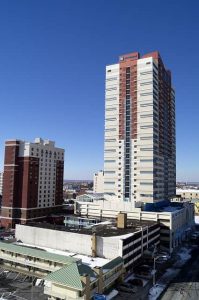What is the difference between condo and apartment, or townhouse and condo? This article seeks to dispel some of the myths and make it easier for you to make a choice on the sort of property that you will be looking for. What the best option is for you will usually boil down to how much money you have in reserve that you can spend on getting a mortgage. You also need to think about the most suitable options for your family and your own personal preference.
Is There a Difference Between an Apartment and a Condo?
There are actually some significant differences between apartment and condo living. An apartment block is usually made up of a number of smaller apartments within a large building, often set over dozens of floors, especially in built-up areas. What’s the difference between a condo and an apartment when it comes to your finances? Well, in the majority of cases you don’t own the apartment, you merely pay a monthly rent to live there. This also means you aren’t responsible for the upkeep. In a condo, you will still pay a monthly fee, which is designed to help with the upkeep, and go into the homeowners association to pay for renovations and communal spaces.
What is a Condo?
A condo is a unit in a community living setup. This might be a high-rise building. The condo is a building you actually own, and you often don’t get the option to rent a condominium. You also pay into the homeowners association. This means that there are usually communal facilities and maintenance that are taken care of by the HOA. There are lots of benefits to this, and you don’t have to worry too much about upkeep. Not much besides decorating is your duty to fix. This is a good option for those who don’t want to do too much work on a home, but it can be a little restrictive, as we’ll explore below.
Investing in a Condo vs Renting
When you rent a property, all of the money goes to the owner of that property. So, when you’re renting an apartment, you aren’t paying towards a mortgage or building up any equity or ownership. With a condo, while you are still paying towards the HOA, which is not money you can recoup, there are some key advantages when compared to renting a house or an apartment.
- When you want to move, you can sell the condo and recoup some of the money.
- You can own a condo outright.
- In some scenarios, you can rent a condo out.
There are some downsides to a condo. The difference between apartment and condo might actually lead you to prefer an apartment. It can have less flexibility in terms of how much you are allowed to do. Even though you own it, you are bound by rules regarding changes you can make to the property. Also, an apartment makes it easier to move house at short notice.
 Selling a Condo
Selling a Condo
Because of the rules that come along with a condo, and the fact that you can’t make drastic changes, it might be harder to sell a condo when the time comes. You might get lucky, some condo complexes even have waiting lists. It really depends on where you are living and how in demand that space is. However, some people struggle via the traditional route of sale, listing with a realtor. You may find that it is more convenient to sell your multifamily property to investors, who can offer you a cash price quickly and take the condo off your hands.
Other Key Differences Between Apartment and Condo
Other key differences between an apartment and a condo include:
- Apartments usually don’t have HOAs.
- You might find that you share a lot more facilities with a condo.
- You might have amenities on-site, such as gyms, gardens, and pools, paid for through the HOA.
Difference Between Townhouse and Condo
The differences between condos and townhouses can be pretty subtle. Both have homeowners associations and therefore fees attached to that. Also, some townhouse setups are within communities and the whole thing can feel a lot like a condo setup! There are some important differences to understand, though. A townhouse is not a condo, and in the majority of cases, it gives you much more flexibility when it comes to what you can actually do with the home. This can also come with more responsibility, though. Depending on the contract you sign when you are moving in, you will probably be responsible for things like repairs in your unit, which, in a condo, might be paid for from the HOA.
What is a Townhouse?
Townhouses tend to have shared external walls with the neighbors. They may have yards and outdoor spaces that are not really common in condos. The homeowner gets more space when they buy a townhouse and often own the land it sits on as well as the home itself. You can also find that you have more freedom for what you wish to do with the home. However, there are some similarities. The grounds and exterior may still be kept by an HOA, which you will have to pay into. A townhouse could be considered a middle ground between a single-family home and a condo. It’s usually more spacious, and the rules are slightly more relaxed, but you still have to stick to the restrictions that are in place and pay towards the upkeep of your community, as well as any shared amenities. Of course, there are similarities. Both of these types of properties give you a level of ownership. You don’t get this with an apartment that you rent. Both will need you to budget for your mortgage as well as the agreed contributions to the HOA, which is set up when you first move in.
Key Differences Between a Condo and a Townhouse
The key differences between a condo and a townhouse include:
- Though there is an HOA with a townhouse, you usually pay much less towards this than you would in a condo. You are therefore responsible for more repairs.
- You probably have more flexibility over design decisions when it comes to a townhouse.
- Townhouses have more space in general and could have an outdoor area.
- Condos are easier to maintain for the owners.
- A condo might be more overlooked with more shared entrance areas.
It’s important to understand that some townhouse and condo setups are actually pretty similar. If your HOA agreement covers more than the norm in a townhouse, it can closely resemble living in a condo, just usually a slightly bigger condo!
Conclusion
It’s always a good thing to have options. When you’re thinking about moving, the best thing to do is to consider the types of property you can afford and what will suit your own needs the best. Some people find that a condo is ideal due to the fact that it is low maintenance, but some people find them a little restrictive, plus they can be tough to sell property fast when you move on. A townhouse is normally a little more flexible, but any type of property comes with its unique set of pros and cons.


